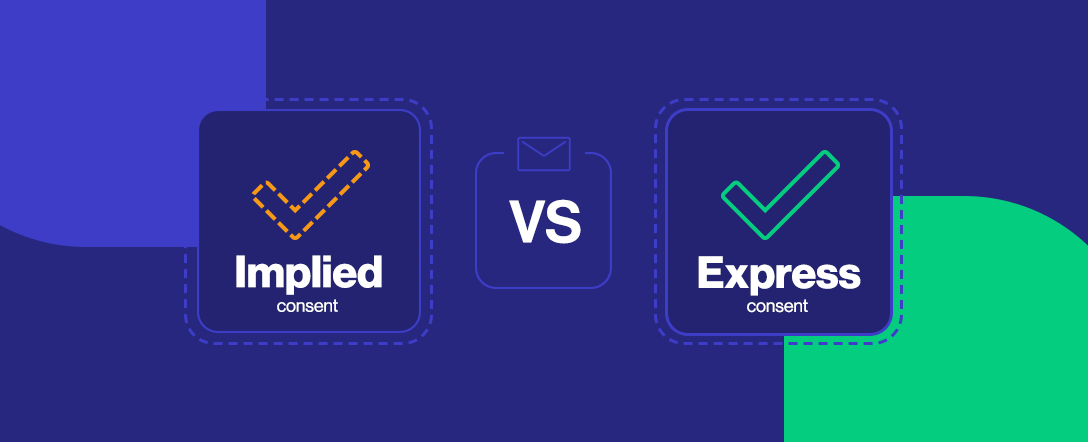Email marketing is a crucial promotional strategy in today’s digital world. However, it’s essential to grasp the nuances of express recipient consent to avoid violating data privacy laws.
Complying to these rulings will also help you create positive customer relationships. Here you will learn the distinctions between implied consent and express consent within the realm of email marketing.
Table of Contents
What is implied consent?
Implied consent is a form of implicit agreement granted by an individual without expressly stating their agreement. Unlike express consent, which is obtained through affirmative user action, implied consent is based on presumptions and implicit circumstances. In the context of email marketing, this means that a company may consider an individual to have consented to receiving promotional email communications in the absence of explicit user authorization.
Implied consent is often used when businesses already have a relationship with a customer or prospect, for instance, when a person has made a purchase or requested information from the company. However, it is crucial to understand the limitations and rules surrounding implied consent to avoid any risk of violating data privacy laws.
Important: don’t forget that some types of tacit consent have a limited duration! This means that to continue communicating with these contacts, you need to ask them to confirm that they agree to receive your communications before their consent expires.
Conditions where implied consent is presumed
Implied consent can be presumed in various situations, but it is important to note that these presumptions may vary according to the laws and regulations in force in each jurisdiction. Here are some examples of conditions where implied consent is generally presumed in email marketing:
- Pre-existing business relationship: When an individual is already a customer of the company or has had a prior business interaction (e.g., made a purchase), it may be presumed that they have consented to receive marketing emails related to their initial interests.
- Publicly accessible contact information: If an individual’s email address is publicly available (e.g., on the company’s website or on professional social networks), implied consent may be considered acquired, provided that the communications are relevant and related to the company’s activities.
- Connection with an interest group: In certain circumstances, implied consent may be presumed if the company sends emails to members of an interest group who share common interests, for example, members of a professional association.
Here are examples of implied consent with expiration dates for retaining your customers’ data:
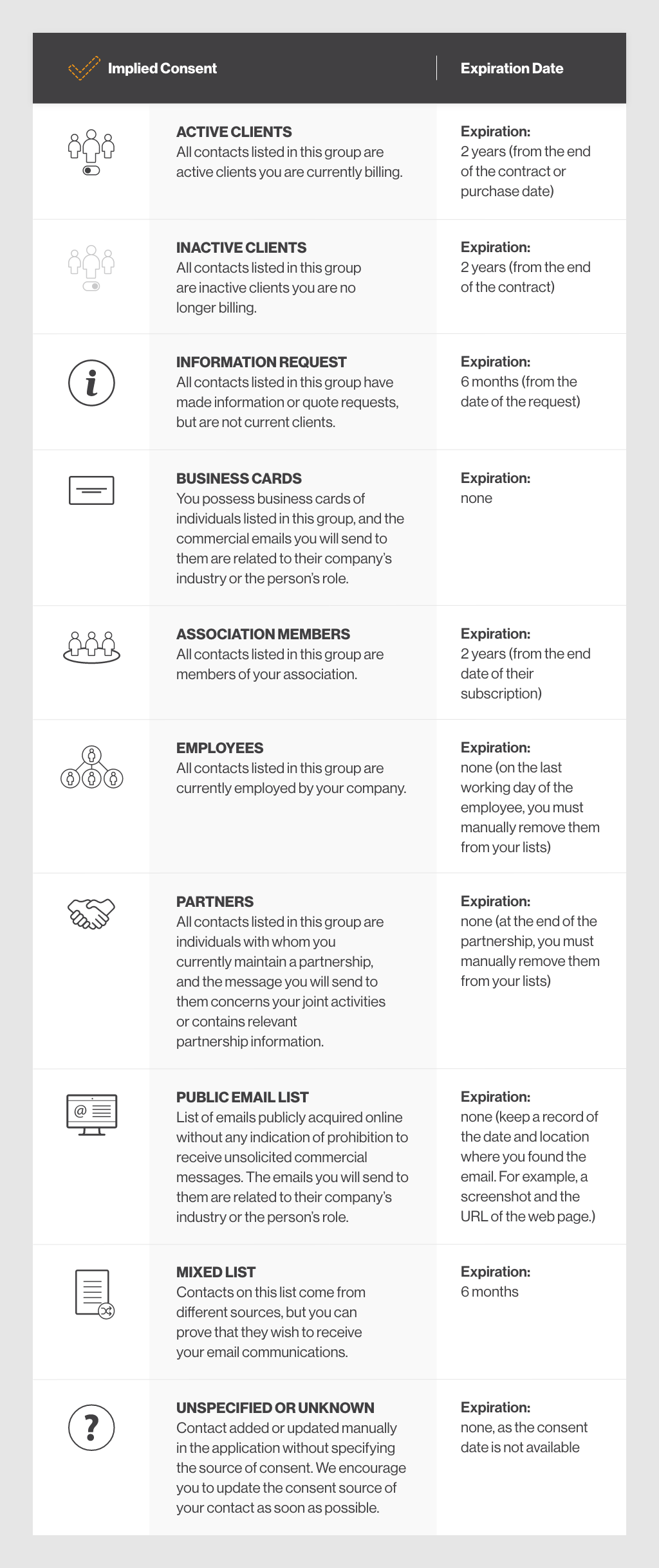
Note: Cyberimpact provides tools to manage expiring consents. To utilize these features, you need to specify a consent date for your contacts.
Benefits of tacit consent:
- Ease of Implementation: Tacit consent may be easier to obtain than express consent as it does not require a specific action from the user. Maintenance of Existing
- Relationships: Tacit consent allows businesses to stay in touch with their current clients without constantly seeking their consent.
- Potential for Customer Expansion: Companies can expand their mailing list by using tacit consent to reach out to prospects who have previously shown interest in their products or services.
Limitations of tacit consent:
- Legal Risks: Using tacit consent can expose businesses to legal risks, as some laws and regulations require explicit consent for sending marketing emails.
- Low Engagement: Recipients may be less engaged with communications from tacit consent, leading to lower open and click-through rates.
- Frequent Unsubscribes: Recipients may unsubscribe more frequently from tacit consent-based mailing lists, potentially reducing the size of the contact database.
What is express consent:
Express consent is a form of explicit consent provided by an individual in a clear and unambiguous manner. Unlike tacit consent, express consent requires a positive action from the user, who must give their agreement explicitly and specifically to receive marketing communications via email. This approval is generally obtained through a checkbox or another method where the user actively provides consent.
In the context of email marketing, express consent means that recipients must have given their explicit agreement to receive promotional emails before the company can send them communications. This is a widely recommended practice to comply with data privacy laws and to establish trusted relationships with users.
How to obtain express consent from recipients
Obtaining express consent from recipients is essential to ensure that email marketing communications comply with privacy regulations and are well-received by recipients. Here are some steps to obtain express consent:
- Clear and Explicit Language: The language used to request consent should be simple, understandable, and unambiguous. It should clearly indicate that the user is agreeing to receive marketing emails from the company.
- Active Opt-In: Use a checkbox or another form of active opt-in for recipients to provide explicit consent. Pre-checked or pre-selected opt-ins are not considered express consent.
- Frequency and Content Information: Provide clear information about how often emails will be sent and the type of content recipients can expect. This helps establish transparency and increased trust.
- Easy Withdrawal of Consent: Ensure that recipients can withdraw their consent as easily as they gave it. Include a prominent unsubscribe link in each email.
Nice to know: Cyberimpact provides tools for you to transform tacit consents into express consents through an automated scenario.
Here are some examples of express consent:
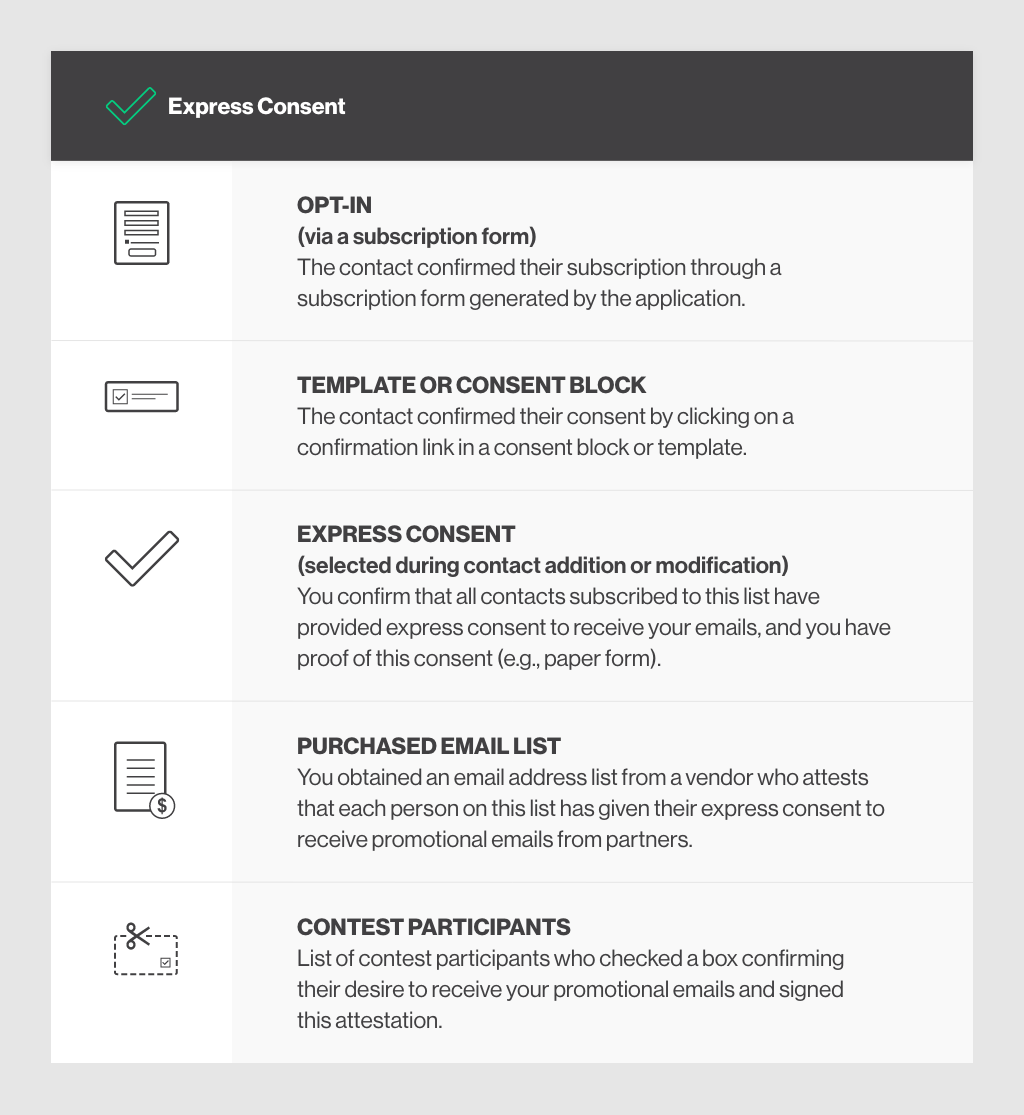
Benefits of express consent
- Compliance with Privacy Laws: Express consent is typically required by privacy laws and regulations, including the European Union’s GDPR. By obtaining express consent, businesses avoid the risks of penalties and fines related to unauthorized use of personal data.
- Increased Engagement: Users who have given express consent are more likely to engage with the company’s communications, leading to higher open, click-through, and conversion rates.
- Enhanced Trust: By respecting recipients’ choices and obtaining their active consent, businesses enhance the trust of customers and prospects, potentially leading to more enduring business relationships.
Summary of pros and cons
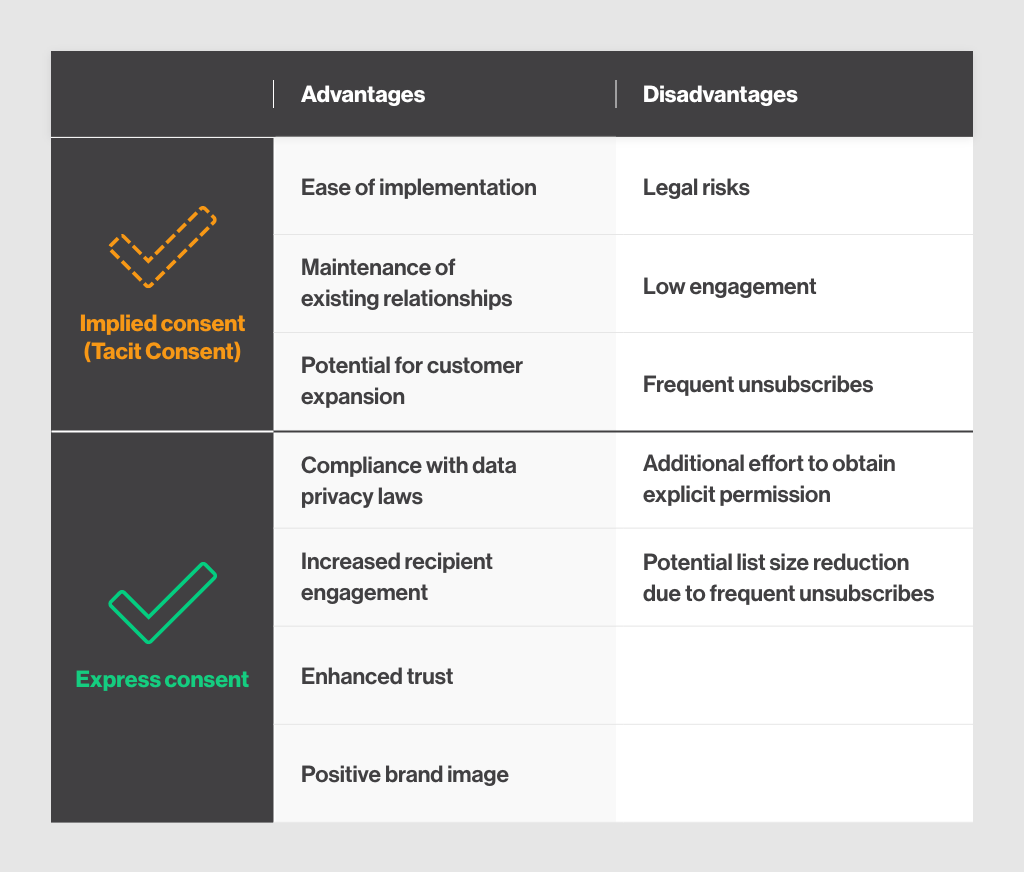
The legal implications of both types of consent
Data privacy regulation is a crucial aspect of email marketing, aimed at safeguarding individuals’ personal information. Many jurisdictions have established specific laws and regulations to govern the collection, use, and retention of personal data. These regulations aim to ensure transparency, security, and user control over their information.
Among the most significant data privacy laws are the European Union’s General Data Protection Regulation (GDPR), the CAN-SPAM Act in the United States, the Personal Information Protection and Electronic Documents Act (PIPEDA) in Canada, and other similar national laws.
The GDPR and express consent
The General Data Protection Regulation (GDPR), which has been in effect since May 2018, is one of the most influential data privacy regulations worldwide. It applies to all businesses within the European Union, regardless of the company’s geographical location. The GDPR emphasizes the need to obtain explicit, specific, informed, and unambiguous consent from individuals before processing their data.
According to the GDPR, consent must be freely given and indicated by a clear affirmative action, such as checking a box or selecting an explicit opt-in option. Additionally, companies must transparently inform users about the purpose of data processing and their rights regarding data protection.
Risks and fines for non-compliance with proper consent
Failure to comply with proper consent can lead to serious consequences for businesses, including legal risks and significant fines. Data protection regulatory authorities have the power to impose sanctions for violations of data privacy laws.
Fines for non-compliance with proper consent can vary depending on the jurisdiction and the severity of the violation. For example, the GDPR provides for fines of up to €20 million for the most serious offenses, such as processing data without valid consent.
In addition to fines, non-compliance with proper consent can also result in a loss of customer trust, damage to the company’s reputation, and potential legal actions by affected individuals.
European, US, Canadian Laws (PIPEDA) and Quebec (Law 25):
It is important to note that there is no specific law called “European, US, Canadian Laws (EUCCL) and Quebec (Law 25).” Instead, each region has its own specific data privacy and email marketing laws and regulations.
- Europe (EU): The General Data Protection Regulation (GDPR) is the primary data privacy regulation in Europe. It applies to all businesses processing personal data of residents of the European Union, regardless of their geographical location.
- United States: In the United States, the main law concerning email marketing is the CAN-SPAM Act (Controlling the Assault of Non-Solicited Pornography and Marketing Act). It establishes rules for sending commercial emails and requires senders to provide recipients with a way to unsubscribe from mailing lists.
- Canada: The Personal Information Protection and Electronic Documents Act (PIPEDA) is the Canadian law relating to data privacy. It applies to organizations processing personal data in the course of commercial activities.
- Quebec: Law 25 is a Quebec law concerning the protection of the personal information and privacy of Quebec residents. Its aim is to enhance the protection of the personal information of Quebec citizens by regulating the collection, use, disclosure, and retention of such information by private businesses and public organizations.
Each law has its own requirements for consent, data collection, and use of personal information. It is essential for businesses to comply with the specific laws of the regions in which they operate and obtain proper consent from recipients for their email marketing campaigns.
The importance of transparency and easy unsubscribe
To ensure email marketing that respects consent, certain essential practices must be implemented. Firstly, having a clear and easily accessible unsubscribe policy is crucial. Recipients should be able to unsubscribe easily if they no longer wish to receive promotional emails. Including a prominently visible unsubscribe link in every email helps facilitate this process for users.
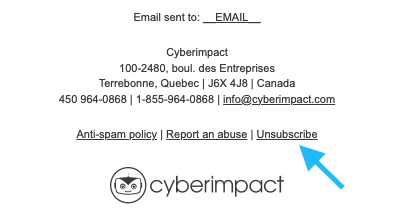
Transparency regarding the sender is also paramount. It’s essential to clearly identify the email sender and provide contact information so recipients know who to reach out to in case of questions or concerns. This transparency builds trust and demonstrates to recipients that the company is open and ready to communicate.
Additionally, inform recipients about the frequency of your planned marketing email sends. This practice allows users to know what to expect and prevents them from being overwhelmed by overly frequent emails. Clear communication about the sending frequency helps maintain recipient engagement and prevents them from feeling harassed.
Conclusion
In conclusion, both implied consent and express consent play a pivotal role in email marketing. While implied consent may appear simpler, express consent is recommended and considered a best practice in data privacy and for establishing lasting customer relationships. By opting for express consents, businesses can enhance their reputation and achieve more favorable outcomes in their email marketing campaigns.
